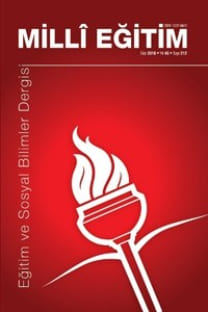ÖĞRENCİ KONSEYİ SEÇİMLERİNDE SOSYAL BİLGİLER ÖĞRETMEN ADAYLARININ DEMOKRATİK TUTUMLARI (GAZİ ÜNİVERSİTESİ ÖRNEĞİ)
Bu araştırmanın amacı, Sosyal Bilgiler öğretmen adaylarının demokratik tutumlarının öğrenci konseyi seçimlerine yansıma durumunu ortaya koymaktır. Araştırmada betimsel yöntemden yararlanılmıştır. Araştırma, 2009-2010eğitim-öğretim yılında Gazi Üniversitesi Gazi Eğitim Fakültesi Sosyal BilgilerEğitimi programında okuyan toplam 409 öğretmen adayı ile gerçekleştirilmiştir.Veri toplama araçları olarak Genç (2009) tarafından geliştirilen “DemokratikTutum Ölçeği” ile seçime katılan öğretmen adaylarının imza sirküleri kullanılmıştır. Veriler, SPSS 10.0 paket programı aracılığıyla betimsel analiz, bağımsızgruplar için t testi ve tek yönlü varyans analizi yapılarak çözümlenmiştir.Araştırma sonucunda öğretmen adaylarının demokratik tutum düzeylerinincinsiyet değişkenine göre farklılaştığı; buna karşın anne ve baba eğitim durumu,aylık gelir, öğrenim şekli ve öğrenim gördükleri sınıf değişkenlerine göre birfarklılaşma olmadığı görülmüştür
Anahtar Kelimeler:
: Sosyal Bilgiler Öğretmen Adayı, Sosyal Bilgiler, Demokratik Tutum, Tutum Ölçeği, Öğrenci Konseyi
PROSPECTIVE SOCIAL STUDIES TEACHER’S DEMOCRATIC ATTITUDES IN STUDENT COUNCIL ELECTIONS (SAMPLE OF GAZI UNIVERSITY)
The aim of this study is to figure out the reflection of prospective social studies teachers’ democratic attitudes on student council elections. Descriptive method was used in this study. Within this context, the study was conducted with 409 prospective social studies teachers who were studying as first, second, third and fourth year undergraduate students in Gazi University, Gazi Faculty of Education in the 2009-2010 academic years. “Democratic Attitude Scale”, developed by Genç (2009), and signature specimen of prospective social studies teachers were used to collect data. The collected data were analyzed with SPSS 10.0 packet programme by using descriptive analysis, independent sample t-test and one-way ANOVA. Results of the study showed that democratic attitude level of the prospective teachers differed significantly in terms of sex variant, but educational level of parents, monthly income, education style and year did not have a remarkable effect on their democratic attitudes.
Keywords:
Prospective Social Studies Teacher, Social Studies, Democratic Attitude, Attitude Scale, Student Council.,
- ISSN: 1302-5600
- Yayın Aralığı: Yılda 4 Sayı
- Başlangıç: 1973
- Yayıncı: Milli Eğitim Bakanlığı
Sayıdaki Diğer Makaleler
İLKÖĞRETİMDE SESLİ OKUMANIN ÖNEMİ VE YARARLARI
Hayrettin ERGÜN, Zeynep GÜREL, Mehmet Ali ÇORLU
Hayrettin ERGÜN, Zeynep GÜREL, Mehmet Ali ÇORLU
İLKÖĞRETİM 8. SINIF TÜRKÇE DERSİNDE OKUDUĞUNU ANLAMA STRATEJİLERİNİ KULLANMANIN, TUTUMA ETKİLERİ
BEDEN EĞİTİMİ ÖĞRETMENLERİNİN HİZMETİÇİ EĞİTİM PROGRAMLARINI DEĞERLENDİRMESİ
UNESCO’NUN MEDYA OKURYAZARLIĞI EĞİTİMİ FAALİYETLERİNE TOPLU BİR BAKIŞ
